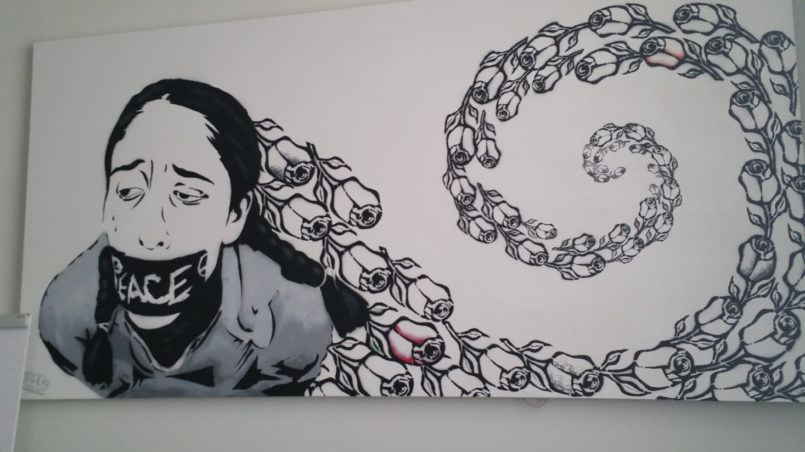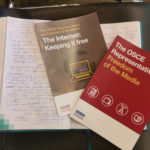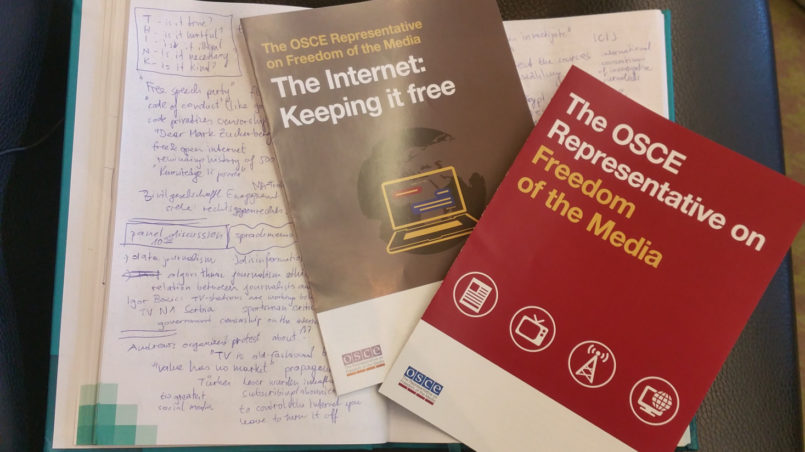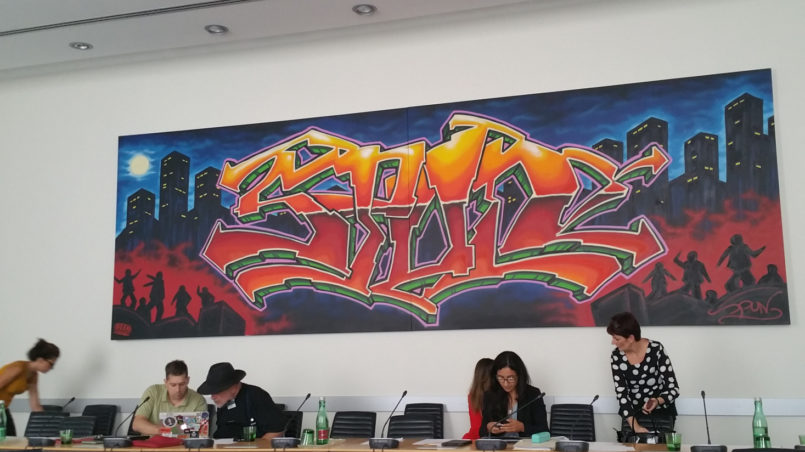Digital Edge: Freedom of Expression 2016

The cornerstone towards “freedom of expression” was laid for the fourth time at the OSCE conference on “Digital Edge: Freedom of Expression” in the Vienna Hofburg. The main topics of the conference related to digital journalism and the implementation of BigData, as well as the protection of sources of information.
Content on the Internet is sprouting like mushrooms after the rain in an uncontrolled manner in cyberspace.
Over 120 journalists, managers, jurists, state representatives, IT-experts, scholars, artists and human rights activists from over 14 countries in South Eastern and Central Europe reported and advised for two days on the topic of Strengthening Internet Freedom.
How should one deal with freedom of expression in a digital age?
enquired Dunja Mijatović, OSCE representative for media freedom, in the opening speech as a stimulus for thought. Decisions and solutions when free speech is violated are at stake. However, who decides when something will be subject to censorship still lies in the hands of the platform provider who defines the degree and the limits of hate speech and censorship in which Newspeak is presented. If these mechanisms are lacking, crimes can be committed, independent of the respective legislation. Media freedom also depends on the media authorities which could also, among others, be prone to violate human rights. Media moguls, like broadcasters and media agencies in different countries, are such authorities.
In this case mainly bloggers, who enjoy no, or little, protection, become involved by leaking information. Journalism is clearly overstretched with the (too) fast developing Internet. If there is no data protection, all of society will suffer because whistleblowing has become a permanent feature of our world. The primary task of whistleblowing is to inform the public about irregularities in governments and large companies – anything else would be spying. The lack of protection for whistleblowers directly affects the fourth estate which was formerly the gatekeeper of the State. The fourth estate, i.e. the media, finds itself in a crisis a consequence of which is the inhibition of investigative journalism; quasi, lost in BigData, data jungle, online attacks and paranoia (look at the case of Edward Snowden).
Nowadays it is easier to find information sources with Spy-Ware, to deal with press offices with online threats or to blackmail people. If governments and companies prohibit or even completely abolish the encryption between media and sources, the fourth estate will fall apart completely. BigData, press bots and paternalism algorithms will not longer be able to keep readers in the illusion of the individually constructed media matrix. Then there will once again be a reason to pull the “anonymous” card. It has been proven that Facebook can steer emotions. That YouTube can serve as a harassment tool has also been proven. Abusing social media as an online pillory is however not its purpose.
On the first day the constructive analysis of freedom of expression was dealt with and whether the Internet signals its death. Or possibly only a crude attempt to introduce censorship in some form? Constructive journalism, not that from the perspective of party propaganda but rather that from the perspective of citizens, critical and inquiring, has to further develop and mechanisms to protect information have to be improved. In order to make the interaction between politics and user better, it is important to make algorithms, which above all run in the background on social media platforms, more transparent. To date it has hardly been possible outwith OpenSource for a user to control or regulate their flow of data to 100%. On Facebook and Google, the collection of information has been made more difficult because these platforms already take the decision for us as to what content they propose. Just as Google do with customized advertising.
The only possibility to burst out of this bubble is to reduce activity on the Internet and not only on Facebook, Twitter and Google.
On the second day, the fundamental theme of the regulation of the Internet was addressed. The closer relationship to the reader was also discussed and why net neutrality plays a significant role in freedom of expression. There is no reason to spread hate, racism and fear on the Internet. The purpose of the Internet is to allow everyone to communicate on an equal footing with each other in a respectful manner. Freedom of expression has to be valued and cannot be allowed to play into the hands of BigBrothers and BigSisters.
Only in this way can an open society survive.
As long as NGOs and human rights organisations contribute to designing and maintaining digital rights will a better path be followed. The immeasurable contribution of voluntary bloggers, experts in algorithms and artists is also vital.
The conference was brought to Europe and financed by generous donations from foundations.
Translation into English: Donna Stockenhuber
Credits
| Image | Title | Author | License |
|---|---|---|---|
 |
SPUN | Patryk Kopaczynski | CC BY-SA 4.0 |
 |
Die Hauptthemen | Patryk Kopaczynski | CC BY-SA 4.0 |
 |
Peace | Patryk Kopaczynski | CC BY-SA 4.0 |


